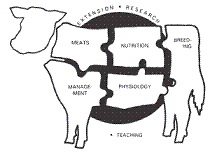Animal Science, Department of

Nebraska Beef Cattle Reports
Date of this Version
2023
Citation
2023 Nebraska Beef Cattle Report
UNL Beef, Institute of Agriculture and Natural Resources, University of Nebraska-Lincoln
Abstract
A three-year experiment evaluated the effects of two supplementation strategies on yearling cattle performance and producer returns to management. Yearling cattle grazed on crested wheatgrass pastures and were supplemented either throughout the entire grazing season, only during the latter part of the grazing season, or not supplemented at all. The supplemented yearlings received 3.5 lb of dried distillers grains with solubles 6 days/week. On average non-supplemented yearlings had an average daily gain of 1.1 lb/d and providing supplement increased average daily gain by 0.5 lb/d. Yearlings supplemented during the latter part of the season had similar performance to yearlings supplemented the entire season, with decreased supplementation costs. Providing supplement through the entire grazing season returned $14.96/animal and providing supplement during the latter part of the grazing season returned $32.31/animal more than the non-supplemented roup. Strategic supplementation as grass quality declines is a management tool to increase gain of yearlings and financial return to management.
Included in
Large or Food Animal and Equine Medicine Commons, Meat Science Commons, Veterinary Preventive Medicine, Epidemiology, and Public Health Commons

